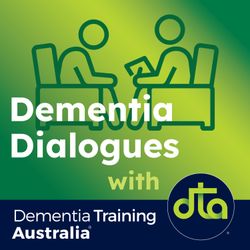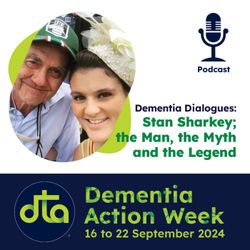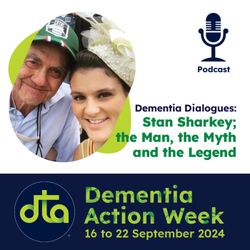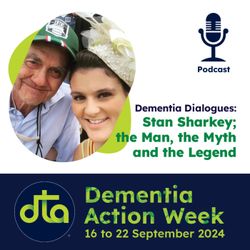Latest episode

3. Environments
20:41||Season 2, Ep. 3At some point, or another, we've all likely experienced the feeling of losing our bearings - maybe even the anxiety and fear that follows. Now imagine that constantly, because you’re a person living with dementia. What if there was a way to reduce the potential for that feeling? Well, there is. And it has everything to do with the physical space, the design of the environment, and how we think about what it means for a person living with dementia. The smallest of things the average person may not even notice can make all the difference - and there’s always room for improvement, in any space, big or small. Today, we’ll be chatting to Fallon Forbes from DTA to understand environments, how they impact a person living with dementia, and ways a space can be improved to make it more dementia-friendly - it’s easier than you might think… We’d like to show our respect and acknowledge the traditional custodians of these lands. We extend this respect to elders’ past, present and emerging, and to all Aboriginal and Torres Strait Islander peoples. We also pay respect to Aboriginal and Torres Strait Islander peoples living with dementia and their carers.Dementia Dialogues with DTA is produced and funded by Dementia Training Australia. We’d like to give special thanks to our contributors and researchers for this episode. For more information about DTA and our training opportunities, tools and resources please visit dta.com.au. For more information about the podcast, please contact info@dta.com.au or engage with us on our social media platforms – Facebook, LinkedIn, X and Instagram.
More episodes
View all episodes

2. Allied Health
18:25||Season 2, Ep. 2When we think about a dementia diagnosis, it’s easy to associate care with doctors and nurses, living facilities and how various changes are going to impact the loved ones of a person living with dementia. But just like with any stage of life, there are multiple areas of care that are essential to improving and maintaining health and wellbeing. Enter Allied Health - from occupational therapy and speech pathology to nutrition and optometry, and all the other key areas of health in between. On this episode, we’re joined by Ellie Newman, DTA’s own Western Australia Director and qualified physiotherapist, to discuss all things allied in the dementia care space, the role allied health professionals play in caring for someone living with dementia, and why it’s so important to remember that care should be looked at through a person-centred, holistic lens. We’d like to show our respect and acknowledge the traditional custodians of these lands. We extend this respect to elders’ past, present andemerging, and to all Aboriginal and Torres Strait Islander peoples. We also pay respect to Aboriginal and Torres Strait Islander peoples living withdementia and their carers.Dementia Dialogues with DTA is produced and funded by Dementia Training Australia. We’d like to give special thanks to our contributors andresearchers for this episode. For more information about DTA and our training opportunities, tools and resources please visit dta.com.au. For more information about the podcast, please contact info@dta.com.au or engage with us on our social media platforms – Facebook, LinkedIn, X and Instagram.
1. Wandering and Getting Lost with Dementia
20:42||Season 2, Ep. 1People living with dementia are at risk of getting lost — especially if they also wander. But did you know these are two distinct behaviours? In this episode, we dive deep into the differences between wandering and getting lost, why they happen, and how we can reduce the risks.We’re joined by DTA's Changed Behaviour expert, Margaret MacAndrew, for an insightful conversation. Whether you're a carer, clinician, or simply curious, this episode offers practical knowledge and compassionate perspectives on a topic more common than many realise.We’d like to show our respect and acknowledge the traditional custodians of these lands. We extend this respect to elders’ past, present, and emerging, and to all Aboriginal and Torres Strait Islander peoples. We also pay respect to Aboriginal and Torres Strait Islander peoples living with dementia and their carers.Dementia Dialogues with DTA is produced and funded by Dementia Training Australia. For more information about DTA and our training opportunities, tools and resources please visit dta.com.au. For more information about the podcast, please contact info@dta.com.au or engage with us on our social media platforms – Facebook, LinkedIn, X and Instagram.
6. Stan Sharkey - The Legend (Part 3)
20:01||Season 1, Ep. 6For the final part of our 3 part series of Stan Sharkey and his life, made possible by our sit down interview with his daughter Emma (and yes, her beautiful newborn son Cooper) we’ll be discussing Stan’s transition into full time care, the importance of care from the perspective of a loved one, and how diagnosis doesn’t have to become how they’re defined, even after they’re gone. We’d like to show our respect and acknowledge the traditional custodians of these lands. We extend this respect to elders’ past, present, and emerging, and to all Aboriginal and Torres Strait Islander peoples. We also pay respect to Aboriginal and Torres Strait Islander peoples living with dementia and their carers.We’d like to thank Stan’s daughter, Emma for her contribution in the making of this episode, in recognition of Dementia Action Week. Dementia Dialogues with DTA is produced and funded by Dementia Training Australia. For more information about DTA and our training opportunities, tools and resources please visit dta.com.au. For more information about the podcast, please contact info@dta.com.au or engage with us on our social media platforms – Facebook, LinkedIn, X and Instagram.
5. Stan Sharkey - The Myth (Part 2)
22:50||Season 1, Ep. 5Sometimes when you’re involved in the care of a person living with dementia, and you didn’t know them before diagnosis, it’s easy to forget there was usually a sign, or a tipping point, or a moment in time for their loved ones that lead to getting further answers. And for so many, that part is the scariest for someone who knew them before. In this part of our sit-down interview with Stan’s daughter Emma (and with help from her newborn son Cooper), we chatted about understanding dementia; the potential myths and hardships involved with the diagnosis process and how that can change a family. We’d like to show our respect and acknowledge the traditional custodians of these lands. We extend this respect to elders’ past, present, and emerging, and to all Aboriginal and Torres Strait Islander peoples. We also pay respect to Aboriginal and Torres Strait Islander peoples living with dementia and their carers.We’d like to thank Stan’s daughter, Emma for her contribution in the making of this episode, in recognition of Dementia Action Week. Dementia Dialogues with DTA is produced and funded by Dementia Training Australia. For more information about DTA and our training opportunities, tools and resources please visit dta.com.au. For more information about the podcast, please contact info@dta.com.au or engage with us on our social media platforms – Facebook, LinkedIn, X and Instagram.
4. Stan Sharkey - The Man (Part 1)
18:23||Season 1, Ep. 4We all know that when someone we care about gets a diagnosis of dementia, that sometimes it’s hard to think about anything else; that everything from that moment on becomes about their care, because it’s so important to their wellbeing. But like we’ve touched on in previous episodes, really knowing a person is a great place to start caring for them. After all, a dementia diagnosis isn’t a person’s whole life story, and it doesn’t have to be their defining character trait or legacy if we don’t want it to be. And with that in mind, we wanted to talk about Stan. Stanley Sharkey, affectionately referred to as Stan by most who knew him, was a man of many talents, ambitions, and passions. He lived for the ideals of fairness and hard work, he lived for the underdog, and he lived for his family and loved ones. Anyone who had the pleasure of knowing Stan will also tell you he lived for the South Sydney Rabbitohs – a detail we’ll delve into a bit later. Over the years of his life, he built a name and reputation on the principle of a good and honourable fight – something to be respected and admired. And that was no easy feat. But in spite of every career milestone, every life goal achieved, he still saw himself as just a man from humble beginnings. And it’s where we’re starting off in this 3 part series, with the help of his daughter, Emma and her newborn son Cooper (who was eager to join in on the conversation)… We’d like to show our respect and acknowledge the traditional custodians of these lands. We extend this respect to elders’ past, present, and emerging, and to all Aboriginal and Torres Strait Islander peoples. We also pay respect to Aboriginal and Torres Strait Islander peoples living with dementia and their carers.We’d like to thank Stan’s daughter, Emma for her contribution in the making of this episode, in recognition of Dementia Action Week. Dementia Dialogues with DTA is produced and funded by Dementia Training Australia. For more information about DTA and our training opportunities, tools and resources please visit dta.com.au. For more information about the podcast, please contact info@dta.com.au or engage with us on our social media platforms – Facebook, LinkedIn, X and Instagram.
3. Changed Behaviour
16:23||Season 1, Ep. 3Changed behaviour, if misunderstood, can sometimes seem like a frustrating and maybe even scary symptom of living with dementia - especially for loved ones and carers. On this episode, we’ll be looking at changed behaviour; what it is, how it presents and how understanding and education can help minimise the possibility of resulting negative experiences for people living with dementia and those who care for them. Dementia Training Australia would like to show our respect and acknowledge the traditional custodians of these lands. We extend this respect to elders’ past, present and emerging, and to all Aboriginal and Torres Strait Islander peoples. We also pay respect to Aboriginal and Torres Strait Islander peoples living with dementia and their carers. Dementia Dialogues with DTA is produced and funded by Dementia Training Australia. We’d like to give special thanks to our contributors and researchers for this episode. For more information about DTA and our training opportunities, including our available courses and resources on changed behaviour, please visit dta.com.au. For more information about the podcast, please contact info@dta.com.au or engage with us on our social media platforms – Facebook, LinkedIn, X and Instagram.